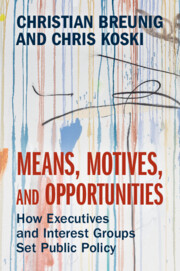Book contents
- Frontmatter
- Dedication
- Contents
- Figures
- Tables
- Acknowledgments
- Part I Setting Public Policy
- 1 Explaining One Million Policy Stories
- 2 Meeting at the Margins
- Part II Motives, Opportunities, and Means of Policy Change
- 3 Motives
- 4 Opportunities
- 5 Means
- 6 How Interests and Executives Set Public Policy in Four States with Nat Rubin
- Part III Public Policy and Budgeting in the American States
- 7 Conclusion
- References
- Index
7 - Conclusion
Public Government of Public Monies
Published online by Cambridge University Press: 11 April 2024
- Frontmatter
- Dedication
- Contents
- Figures
- Tables
- Acknowledgments
- Part I Setting Public Policy
- 1 Explaining One Million Policy Stories
- 2 Meeting at the Margins
- Part II Motives, Opportunities, and Means of Policy Change
- 3 Motives
- 4 Opportunities
- 5 Means
- 6 How Interests and Executives Set Public Policy in Four States with Nat Rubin
- Part III Public Policy and Budgeting in the American States
- 7 Conclusion
- References
- Index
Summary
Governors are motivated to change public policy in response to issues and have powers that influence the shape and direction of budgets; however, interest groups are ultimately providing opportunities for action. We conclude with some broad recommendations for institutional and political tinkering in the American states. Specifically, we argue that policymakers can embrace the inevitability of interest group involvement in policymaking and be more thoughtful about the way they structure policies. This process enables diversity – by which we mean more groups with difference and alternative policy concerns – in representation. In addition, we argue that decentralization of gubernatorial power over the budget to alternative institutions could facilitate budgets that are more responsive to problems.
Keywords
- Type
- Chapter
- Information
- Means, Motives, and OpportunitiesHow Executives and Interest Groups Set Public Policy, pp. 221 - 236Publisher: Cambridge University PressPrint publication year: 2024



